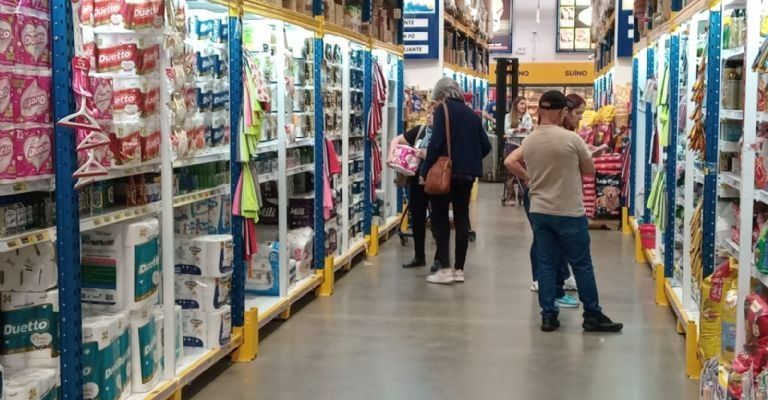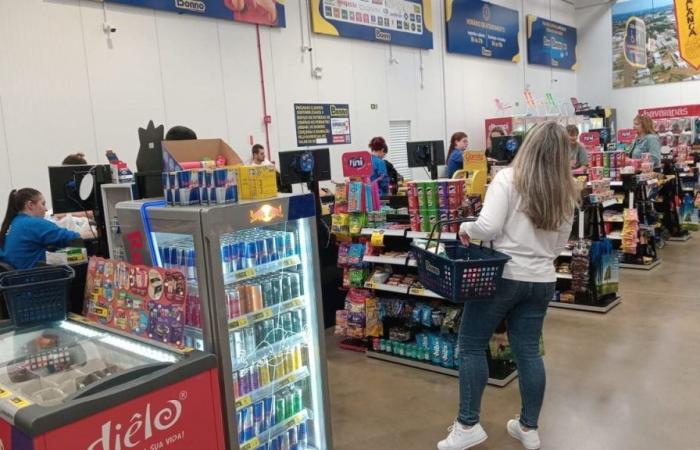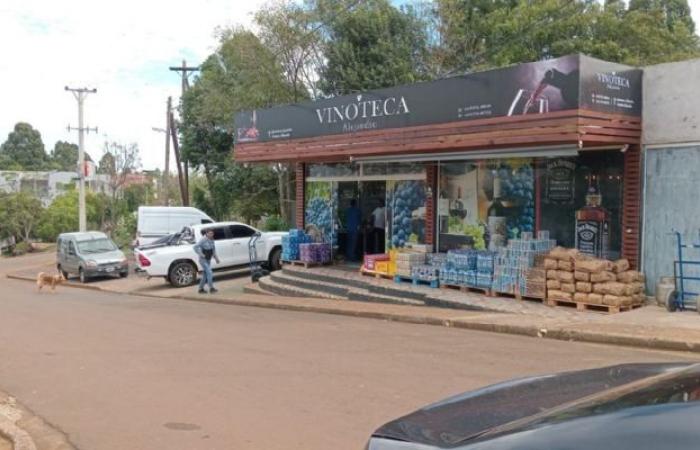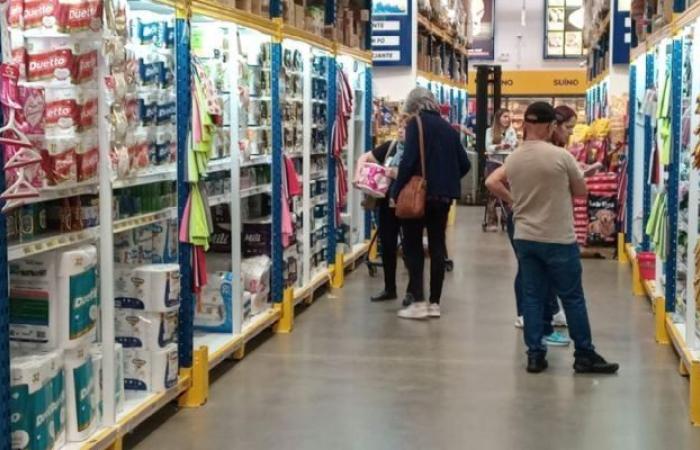Due to the lack of sales in businesses in the missionary town of Bernardo de Irigoyen, a dry border with the Brazilian town of Dionisio Cerqueira, merchants offer merchandise that they purchase in Brazilian hypermarkets and supermarkets.
It is common to see on the shelves, mixed with Argentine products, sugar, yerba, noodles, coffee, rice, milk, juices, among others, that are crossed, “circumventing” border control. “We are very bad, the missionaries buy everything in Brazil because it is much cheaper for them. It makes it impossible for us to compete”; said Carlos M., a food merchant from Bernardo de Irigoyen.
“I recognize that I cross wherever and bring food and cleaning products, this allows me, in a way, to compete with the other side (for Brazilian businesses), otherwise I have to close my business.”
Carlos M. offers these products mixed with Argentine products. “I bring, for example, coal that I even offer at the door of the business.”
Carlos M.’s situation is similar to that of other merchants. “We don’t sell anything. I bring merchandise from the other side with my truck that I buy at the hypermarket. People take these products, which I sell much cheaper, of course. The consumers who come and take these products are those who don’t have vehicles and it’s difficult for them to cross the border,” said Marianela K.
Tax benefits
“We need a special border regime with tax cuts, because the numbers do not close us. People come to buy from us the last week of the month when they run out of money and use their credit card because it is not convenient for them to use it in Brazil”.
Despite the rise in the real blue (on the weekend it was trading at 250 pesos) it is still convenient for the missionaries to buy merchandise of all kinds in Brazil. Even in the construction sector the difference is notable.
In the hardware stores of Bernardo de Irigoyen you can buy cement, lime and Brazilian sand. “I bring it from the other side, because otherwise I won’t sell anything”; recognized Pablo S., who has no problem offering it in the middle of the street.
In the area of household appliances the difference is very important. A standard four-burner stove can be found at Dionisio Cerqueria for about 160,000 Argentine pesos, while the same stove at Bernardo de Irigoyen costs about 300,000 pesos.
“I have a person who gives me kitchens and, of course, I sell them in my business. The difference is very big, because I can offer them between 200,000 and 220,000 pesos when the national ones cost no less than 300,000 pesos”; said Monica A. owner of a home goods business. In this business you can also purchase washing machines, stoves, dryers and even Brazilian bazaar items.
The difference is that for items brought “smuggled” from Brazil There is no credit, they must be paid with pesos or reais.
Competition also occurs in the restaurant sector. The businesses in Bernardo de Irigoyen had to lower their prices and offer buffets at no more than 8,000 pesos per person and barbecue at no more than 11,000 pesos per diner. The fact is that in the Brazilian city the buffet costs about 35 reais per person (8,750 pesos) and the espeto course costs 50 reais per person (12,500 pesos). “We have maintained prices for several months, otherwise people are going to eat on the other side”; said Mario Marchesini, owner of a local business no more than 50 meters from the border.
Reals and pesos
Both in the city of Dionisio Cerqueira and in Bernardo de Irigoyen, reales and pesos circulate as current currencies. In businesses in both cities you can pay with either currency. “We receive reais, today (last Friday) it is quoted at 250 pesos,” said Miguel Ozuna, owner of a wine store.
The same thing happens in Brazil. For example, in the hyper Bonus there are separate boxes. That is, whoever pays with pesos has to go to the boxes that only receive Argentine currency, because the change will be given in pesos. What’s more, these are attended by Argentine employees, who cross daily to work in this business. “I come every day, I am a cashier at this supermarket at the checkouts that receive pesos”; said Susana Poziek, a native of Bernardo de Irigoyen.
porous border
The border between Bernardo de Irigoyen and Dionisio Cerqueira, clearly, is permeable. There are sectors where only a small path separates them. That is why people cross without doing Immigration, even cars and trucks do so in search of merchandise, without going through Customs.
But not only Argentines do it, but also Brazilians who come to the missionary border city to buy wines. “They are lovers of our wines, luckily this sector works very well and we sell a lot, of course we receive real”; said Ernesto Matau, owner of a wine store located in front of the sidewalk that separates both cities. “They have the best wines, I always go there to buy”; said Alex Carvalho.
From Migrations they recognized that it is impossible to control the entire border. “We don’t have people. We know that citizens cross, it is a risk because if something happens to them in Brazil They do not have any type of coverage,” acknowledged Sergio K, an Immigration employee.

During the Covid-19 pandemic, the National Gendarmerie had installed a post, but then they removed it. “There were also four gendarmes who had to guard twelve kilometers of dry border, impossible,” said the Immigration employee.
I have three, four, five and even six…
Taking advantage of the XXL holiday, citizens residing on the border took the opportunity to “take over” Brazilian businesses. But they didn’t just go to buy one item of merchandise, they also had the pleasure of carrying up to six products from the same brand. “I bought six one-liter bottles of oil, which in Misiones costs about 2,000 pesos, and at the Dionisio Cerqueira supermarket I paid about 800 pesos for each bottle,” said Karina Markievich, a native of the Dos Hermanas area, about 15 kilometers from the town. border.
The same happens with rice, polenta, noodles, sugar, coffee, tea, etc. “Argentines take everything and not just one product from each brand, but up to five or six,” said Marcelino Dos Santos in charge of the Súper Bono hypermarket.
“On Thursday and Friday there were people waiting at the door before the supermarket opened,” they indicated. “We live about 120 kilometers from Dionisio Cerqueira, we arrived very early and bought merchandise for about three months and spent about 150,000 pesos, when in Eldorado for the same amount of merchandise we would have spent more than 300,000 pesos. In Brazil we make our salary pay”; said Patricia Rocca, originally from the town of Nueve de Julio.
For her part, Liliana Basiluk from the same city said; “I took advantage of the half bonus and bought items from the bazaar, which in my city I would have paid more than double.” In short, the missionaries take advantage of the favorable change and acquire more than 80% of their merchandise in Brazilian hypermarkets. The cost is the impact on businesses on the Argentine side.








